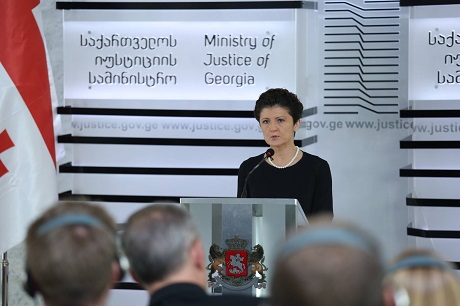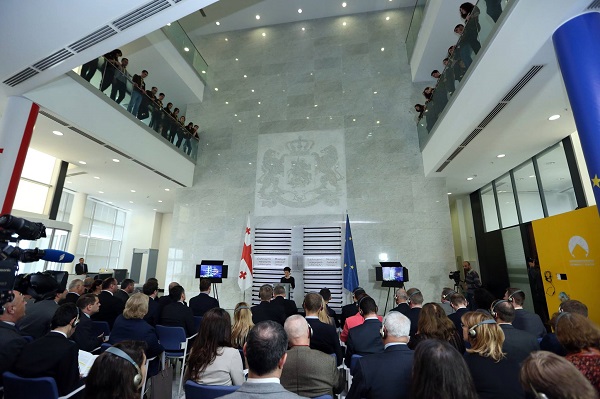Minister Tsulukiani: Justice Ministry made huge gains in past three years

The past three years have been extremely busy for Georgia’s Ministry of Justice; the country signed an Association Agreement (AA) with the European Union (EU), began implementing visa liberalisation requirements and introduced various reforms to make the agency more transparent.
These things and more were spoken about in depth by Justice Minister Thea Tsulukiani at a press conference in Georgia’s capital Tbilisi yesterday. In front of state officials, diplomatic corps and non-governmental organisations (NGOs), Tsulukiani revealed the results of a three-year report of the Ministry’s activities.
She spoke about the advancement Georgia could expect thanks to its AA deal with the EU and the progress made regarding Georgia’s Visa Liberation Action Plan (VLAP). In this regard she stressed Georgia had "successfully fulfilled all the obligations drafted in the VLAP, which was required before being offered a visa-free regime with the EU.
Georgia’s performance in international courts was also on Tsulukiani’s agenda.
The first legal dispute with Russia in 2014 [involving the deportation of Georgians from Russia in 2006] was successfully completed in the European Court of Human Rights. Concerning the second dispute about the August 2008 Russia-Georgia war, we worked hard to achieve that next year Georgian victims of the war will be questioned in the court.”
The International Criminal Court [in The Hague] will launch an investigation concerning the alleged ethnic cleansing of Georgians during the war and its investigation will supplement the studies we conducted in Georgia about the Russia-Georgia war,” Tsulukiani said.
While speaking about the domestic reforms recently introduced in Georgia, Tsulukiani stressed the importance of the reforms to the country’s Department of Juvenile Justice, Chief Prosecutor’s Office, Criminal Code, Procedural Code and plea bargains.

The Minister made her speech in front of state officials, diplomatic corps and non-governmental organisations. Photo by Minister of Justice of Georgia.
We have carried out a reform of pre-trial detention and introduced a very important change – from this summer each judge was now obligated to recheck every two months whether it was necessary for a convict to remain in pre-trial detention.
Through the reforms employees have become more protected. We have also developed Georgia’s migration policy and offered a refined legislative database. We have also introduced the anti-discrimination law,” Tstlukiani added.
On this note Tsulukiani further mentioned the successful reforms and future intentions of the Ministry of Justice. Her comments included:
- Public services have become more available to citizens, with 13 Public Centres of the Justice Ministry recently opened in Georgia;
- Western Poti and Zugdidi Justice Houses were built and opened. The Tianeti Justice House will open today;
- The Election list has become comparably more accurate, with information on 2.4 million Georgian citizens;
- Only 102 cases were sent to the European Court of Human Rights last year, while the figure reached 367 in 2012, 395 in 2011 and 375 in 2010;
- A rehabilitation/resocialisation program for former prisoners was developed, through which 3,000 former inmates received the support of social workers;
- 10, 852 public servants and other individuals participated in a range of trainings at the Justice Ministry’s Educational Centre; 44,000 individuals have been tested there;
- A reform of the Notary, based on which there will not be a municipality without the notary service;
- The Eastern Kvemo Kartli regional archive was constructed and opened in Rustavi;
- The State Public Registry sorted and archived 54, 235 binders; 44 percent of the documents were legitimized;
- The Ministry launched the establishment of a database of individual entrepreneurs; more than 200,000 cases were added to the online version;
- The first ever geodetic mark has been produced in Georgia;
- Comprehensive information of all districts of Tbilisi was added to Google Map, including more than 200 Georgian historical monuments;
- The Webpage Legislative Herald of Georgia was refined with translations in several foreign languages over Georgian legislation.
The Minister particularly emphasised the importance of introducing the Abkhazian language to Georgia’s Justice House webpage. Tsulukiani stressed this service enabled many Georgians living in the de facto region of Abkhazia to get all necessary information concerning the Justice Ministry services. Previously it was only published in Georgian and English.
 Tweet
Tweet  Share
Share